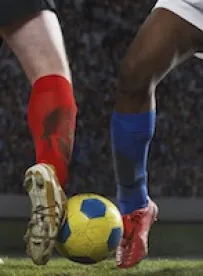0-0 in the final minutes of a game and a player suspiciously goes down in the box to win a penalty, and ultimately all three points. Replays show no contact was made; the player dived. Controversy explodes. The player, the subject of many headlines, walks away without punishment.
Under possible new rules reportedly being mulled over by the English Football Association (the “FA”), players will soon have to deal with more than mere column inches. Reports suggest that the FA is giving serious consideration to the introduction of retrospective bans for players who dive.
So what is the current position, and what may be introduced?
Presently, under The International Football Association Board Laws of the Game 2016-17, Law 12: Fouls and Misconduct, a player can be cautioned for unsporting behaviour if they “attempt to deceive the referee e.g. by feigning injury or pretending to have been fouled (simulation)“. However, this is of course limited to whether the incident has been spotted by the match officials. Statistics for 2015/16 show that only 1.89% of yellow cards were issued for simulation.
Recent games have seen high-profile incidents where match officials have been accused of failing to spot alleged simulation. On 3 December 2016, Tottenham Hotspur’s Dele Alli was accused of diving following an attempted challenge from Swansea City’s Kyle Naughton. Jonathan Moss, the match referee, awarded Tottenham a penalty, despite the alleged lack of contact between the players. More significantly, on 10 December 2016, Hull City’s Robert Snodgrass was awarded a penalty in Hull’s 3-3 draw with Crystal Palace. Snodgrass, who apologised after the game and admitted it was not a penalty, had already been cautioned in the game and a second yellow card would have seen the player dismissed from the field of play.
Players can be penalised retrospectively but the current laws are limited. In accordance with Schedule A of The FA Rules and Regulations of the Association, Season 2016/17, players can only be penalised retrospectively in England when the incident relates to “serious foul play, violent conduct, spitting at an opponent or any other person, offensive, insulting or abusive language or gestures“. The FA may therefore look north for guidance.
In Scottish football, retrospective bans are currently in force. Rule Number 201 of the Scottish Football Association Disciplinary Rules 2016/17 states:
“No player shall cause a match official to make an incorrect decision and/or support an error of judgment on the part of a match official by an act of simulation which results in that player’s team being awarded a penalty kick and/or an opponent being dismissed and/or any other substantial advantage being gained.”
And Clause 13.4.1.7 of the Scottish Football Association Judicial Panel Protocol 2016/17, states that proceedings may be commenced after a game:
“Where a player is alleged to have caused the match official to make an incorrect decision and/or supported an error of judgement on the part of a match official by an act of simulation which results in that player’s team being awarded a penalty kick and/or an opponent being dismissed and/or any other substantial advantage being gained.”
Any player found guilty of breaching this rule is sanctioned with a two match mandatory suspension, as Heart of Midlothian player Jamie Walker found out earlier this season following his team’s 2-1 loss to Celtic.
According to the reports, FA officials will visit the Scottish FA to review the success of the rule in Scottish football. One would therefore assume that any rule in England will likely be of a similar structure to the rule imposed in Scotland.
An introduction of a retrospective ban in English football may not be so straightforward, however. Any proposed new rule will require the agreement of various stakeholders, including the Professional Footballers’ Association, League Managers Association, English Football League and Premier League.
As the FA found out during their last attempt to introduce such a rule in 2013, an agreement is far from guaranteed.
Thomas Noble is the author of this article.



 />i
/>i

